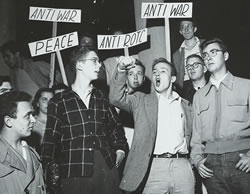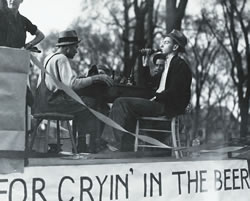 |
 |
 |
||||
 |
|
Eleven nationally known politicians were placed in nomination that year. Convention organizers sent telegrams to the nominees, but some cabled back that they didn’t want the job. A spokesman for ousted President Herbert Hoover telegrammed politely that Hoover did not wish to run. Former New Hampshire Governor John G. Winant was more pointed. “I’m trying very hard to keep entirely out of partisan politics—hope you have lots of fun.” The convention organizers ignored their desires, and the names of Hoover and Winant went to the floor.
Two particularly divisive issues of the day were proposed for the platform. One plank called for the return of prohibition. It was hooted down by voice vote. The plank to endorse the distribution of birth control information—then barred by law—also failed. But supporters pressed for another vote the second day. This time the measure passed. Choosing a nominee proved more difficult. After six votes, the convention was deadlocked between four candidates. Then someone coined a slogan for the former New Hampshire governor that cleverly reflected the stalemate. The slogan read, “Eventually: Winant Now.” The phrase caught on, and the man who had declined the nomination got it anyway—on the seventh ballot—helped along by a frenzy of behind-the-scenes vote trading. Informed of his victory, Winant graciously accepted Oberlin’s nomination, but added that he still didn’t want to be the Republican’s real nominee. Alf Landon, the actual Republican standard bearer in the real fall election, finished third at Oberlin.
Later that year, the College took a straw vote for the actual candidates—Landon and incumbent Franklin D. Roosevelt. Students and faculty alike went for Landon. In the general election, however, the wildly popular FDR buried Landon, who garnered just eight electoral votes. Oberlin’s faulty political radar earned a gentle tweak from the yearbook editors, who noted the students had adopted the slogan: “As Oberlin Goes, So Goes the Nation.” “First, we nominate the wrong man, one who does not even care to run,” the editors observed. “And in the straw vote, we pick a man who got the worst licking of any presidential candidate. Oberlin was Republican in a year when the country went more Democratic than ever before.”
Next Page >> |

